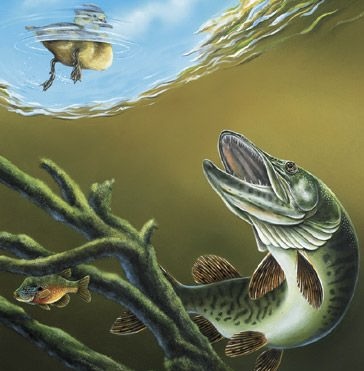|
|

Posts: 70
Location: Minnesota | Hello!
I just wanted to make a short (hopefully) post about how I've done since I got into muskie fishing just about two seasons ago (come this August) and if there is something I can do better or keep in mind.
Over these last two seasons I've hooked and lost one fish (maybe in the mid 40s range) and seen only about six or so follow the bait in. I'd consider myself someone that goes out pretty frequently and for decently long sessions each time, probably two or three times a week for at least six hours a day give or take. I always read up on the lakes I'm fishing, do my research on fish activity and what they "should" be doing each time I go out, and always keep in mind majors and minors if they happen to be at times I can fish em. I try loads of different baits and have found several that I prefer throwing over others; rubber and blades are my favorites, but I tend to throw whatever looks the best at each spot I fish.
Just curious about what else I can do to better my encounters with muskies because I feel that my current statistics are a bit low for how long I've fished for them. Don't get me wrong though, I love every bit of it.
Thanks for reading. | |
| | |

Posts: 198
| Start keeping track of everything in a journal or log. It's amazing the stuff we'll forget. When you build up a decent log it gives you that much better of a starting point each day. | |
| | |
Posts: 73
| In terms of numbers may depend where you’re fishing. They’re a fish of 10,000 casts except in places where they’re not. Sticking to a particular lake/water body and really figuring out the territory can also help. | |
| | |
Posts: 59
| One thing that brought my catch rates up was to always fish in areas with baitfish. If given the choice between a perfectly laid out spot with all the structural and cover ingredients a musky could want but no baitfish and a different spot with pretty lame structure and cover but tons of bait, I will choose the area with bait every time. | |
| | |
Posts: 1646
Location: Brighton CO. | Well some lakes are full of Muskies and they will run small and you can catch numbers of fish but none of them will be over 20 pounds. Over Lakes have trophy ratio 3/1 so one in three will be a trophy. It could take you years to catch your three fish.Hire a guide or make friends with a expert.
Learn the fundamentals.
1. Buy a quality rod and reel.
2. Can you cast backlash free?
3. Synchronzing your retrieve Your lure needs to be coming at you as soon as it hits the water.
4. Can you bring in your lure weed free?
5. Learn how to use each type of lure.
6. Boat control (if you have a bow mount trolling motor point it into the wind cast out in front of you.
Cast retrieve, figure eight (do not take your eyes off your lure)
I've twice caught a Muskie on the first cast of the day and my largest on the last. (the captain bring them boys it's time to quit) Alway's be ready.
There are times I get smoked and come home Muskie free and times the fish are going and get a couple in a minutes. | |
| | |
Posts: 244
Location: Minneapolis, Minnesota | I went through the same thing when I started musky fishing, also in minnesota. I struggled badly up until the last few seasons. One thing you have to keep in mind fishing Minnesota is a lot of our lakes are significantly under stocked compared to what they used to be/should be. A lot of other states normally stock lakes at 1 fish per acre. We only have a few lakes in the state that are at 1 fish per acre and those are what people call the numbers lakes. Most of the lakes get a fish per littoral acre or less, so there aren’t a lot in each lake. Combine low numbers with the highest pressure we’ve ever had and it makes it tough for anyone that wants to catch them regularly. I tried to teach myself to musky fish on vermilion since I have a place there. Most stocking years vermilion is way less than a fish per littoral acre, and gets heavy pressure from some of the best musky fisherman in the world. Musky fishing really didn’t start to click until I started fishing some more densely populated fisheries in the metro and western mn. Once I started catching fish around here I was able to start having success on vermilion which is a way harder lake. Try to get on the most densely stocked lake you can, or try to get to one of the more densely populated natural fisheries in the longville area.
What I did too was try to simplify what I was throwing until I caught something. Put on a smaller bucktail like a frenzy 8/9, a showgirl, or a single blade, and make sure you are 8ing as well as you can. If you throw one of those long enough on a more densely populated lake you will eventually start putting fish in the boat. Before I started getting better at musky fishing I was way overthinking it and always switching baits. Take out one or two baits that you know catch fish and throw it until you get one.
Don’t feel too bad though minnesota can be a tough place to learn to fish sometimes
| |
| | |

Posts: 8863
| Alex, this isn't the case but think of those 6 fish as fish you should have caught. The biggest key to success (depending on where you fish) is converting those followers. That means you need to do a few things:
1. Do an oval or figure 8 on every cast, even when you don't see a fish.
2. Always expect there to be a fish there. 99 out of 100 times there won't be, but the 1 time there is one there you've got to be prepared. I've missed more and seen more missed than I care to remember because I was basically asleep at the wheel.
3. Learn how to read the fish. I hate that term. No amount of reading or casting or TV shows or you tube videos will do you a bit of good there. You've got to learn that by doing. And screwing up. Over and over until you encounter enough fish where you get a feel for what makes them lose interest, what scares them away, what confuses the heck out of them and makes them give up, and what makes them come unglued and smash your lure.
4. Set the hook. Like you mean it. Preferably towards the tail, and not not up. If you allow that fish to get it's head out of the water, you're done.
5. Keep pressure on the fish. Keep a bend in the rod. Slack line is a no-no.
6. Sharp hooks. Stupid-sharp.
Once you get a few under your belt, actually catching them on a figure 8 will become fun. Still a fire drill, but not a disaster every time.
6-1/2: Always position yourself in such a way to be ready to set the hook. It might be as soon as the first cast of the day hits the water, half way back to the boat, tomorrow, or the last cast of the trip.
That said, they're as easy to catch as any other fish. There just aren't many of them around and most of the time they just sit there doing nothing. And don't get discouraged. We had a six fish afternoon. Two guys who I'm sure are way better than us were fishing right around the corner and didn't even see one that day. | |
| | |

Location: PA Angler | My first couple years took me some time to figure it out. Always watch behind your lures, figure eights or some kind of commotion can bring them in. If you have follows remember the spots go back and try again or changing lures up sometimes helps. Look for the holes they are laying in and cast right there and let the lure sink. I’m sure you’ll start to get the hang of things. I caught 1 small one then missed around ten nice size before I finally got one in. Also the right gear helps. | |
| | |

Posts: 543
Location: NW WI | All great advice, personally im gunna jump on board with EsoxWanderer. Just pick a.system and pee pound it. Learn everything u can from and about 1 system. Your success and lack there of on a singular lake will eventually provide you with a formula regardless of all factors. Now, that's not to say what you know from lake A will 100%.apply to lake Q.
I can.tell you this much my guy: I Fish alot with my old man nowadays, he doesn't want to hit the same water more than once and has no idea what he's doing and is stubborn as all heck, just likes to keep exploring I suppose. We do Horrendous!. But it's okay ha ha.
But soon as he changes his rods for shotguns in the fall and I'm solo and keep hitting the same water ...% goes skyrocketing
Edited by 7.62xJay 6/18/2023 10:45 PM
| |
| | |

Posts: 2389
Location: Chisholm, MN | Getting the hang of can be tough. Might take years. What I would do is put on a proven bait and fish smart. I know that’s prettt vague but don’t get caught up in all the new baits. I’d throw a hawg wobbler, mag bulldawg, or red October tube until it happens. Yes just keep casting. It will happen and then after each dish it will get easier and easier until you’re finally to the point where it’s not even that exciting anymore. | |
| | |

Posts: 70
Location: Minnesota | I appreciate all the information and tips from everyone so far.
It sounds like the number one thing I need to do is pick one lake and just hammer it until something happens, which is about the polar opposite of what I have been doing cause I love fishing new bodies of water as often as possible, but I'll give it a good shot. That means I'm probably going to fish Sugar Lake in Annandale area the most since it is the closest to me, though it doesn't have all that dense of a fish population I don't think. Blades and rubber will be what I stick to then; Mag Dawg and a double 8 will be the primary tools until action picks up.
I've got all the "proper" equipment (rods and reels, net, tools, etc). I 8 after every cast pretty well, keep hooks sharp, cast well, and so on. I think I have the skills (depending on how you look at it) and gear to do well, just need to simplify the whole process a bit.
Thanks again everyone for the help! | |
| | |
Posts: 161
| I went 16.5 seasons without a muskie. I stopped keeping track at 500 hours trying to catch one. I started going less, because every outing was a failure. I seriously considered selling my muskie gear too.
In August 2017, the drought ended and I boated 8 by the time the season ended in late October. Since the flood gates opened late 2017, I have have caught 21 more.
Its very physically demanding and it can be mentally draining for long periods of time. Really the only advice I can offer is that eventually you will succeed. Maybe try down sizing your presentation a little. That will target more fish rather than just the bigger ones.
I am also located in Minnesota and the lakes I fish see a fair amount of pressure.
Edited by gimruis 6/20/2023 3:44 PM
| |
| | |
Posts: 2082
| Do you ever fish with experienced muskie guys? Have you fished a day with a guide, could really shorten the learning curve and ensure you are doing the "right things" to succeed..in muskie fishing there is a lot of truth in..if you always do what you've done, your likely going to get what you've got.. I'd really concentrate on going out in low light conditions, be on the water 5am-7am and/or 8pm-10pm, also cloudy/windy days will be your friend, fish all day in these conditions..If you can find someone experienced to go with you, I'd fish at night too. You have to be at the right place at the right time, until you "know" your in the right place, muskie fishing can be tough I've heard, ha! Seriously - Good luck
| |
| | |

Posts: 1466
| I would recommend getting intimate with the lake closest to you. Especially if it's a small lake. You'll be more likely to go, when it's close, even just for a couple hours. Get to know every rock, every weed clump, every change in bottom composition. If you are on a larger lake, I would probably concur with limiting your arsenal to 3-4 proven lure types. However, on a smaller lake, you have the opportunity to use a slightly larger arsenal. I say this, because you're going to get so sick of throwing the same lures at the same spots, over and over and over, just because you have so much less real estate. Which is good. You will have the opportunity, to do crazy things. Try stuff that shouldn't work, in places the fish shouldn't be. You will do this, because you get really bored on a small lake, that you fish all the time. And you will catch fish doing this. An example of what I would use (and I would take a light colored, and a dark colored, of each):
Rabid Squirrel
Suick- the new changable weighted ones
Shallow Swimmin Dawg
Jig and Plastic - twist tails, creatures, etc.
Slammer crank - size depends on your fishery
Regular Dawg
any #8, 9, or even 10, double pladed bucktail
#13 XRap (or any traditional jerk bait) - I prefer a slashing action, with the ability to hover
If nothing else, you will accidentally catch some fish, and encounter a lot more. But in the process, you will know that lake so well, that you will have learned how to fish all the different structure, with different styles and types of baits, at different times of day, in different weather conditions. This will help you when you go to other bodies of water, as you will look at the new body of water, in a different way. You will recognize similar spots(points, weed beds, bays, etc.), to your lake. You will notice bottom transitions, and even pay more attention to the wind. All because you spent a lot of time on the boring little lake with no fish. The more fish you catch at your little neighborhood lake, the more fish you will catch at other lakes.
The reason for my method, is because this is basically what I did (of course some of those baits weren't around then), and I'm satisfied with how things worked out. Just wish I could fish as much as I did back in the day. Looking forward to retirement, if I can actually make it happen.
Last, but not least, join Muskies Inc. Since I'm a North Metro member, that's where I'd say to go, but you are closer to St. Cloud. As you get to know some folks, ask if they want to join you on your local lake for a short outing. I know I don't mind when I don't have to get my boat out and put it away, and still go fishing for a few hours.
Edited by TCESOX 6/20/2023 9:17 PM
| |
| | |
Posts: 244
Location: Minneapolis, Minnesota | Weiseyyy - 6/20/2023 1:27 PM
I appreciate all the information and tips from everyone so far.
It sounds like the number one thing I need to do is pick one lake and just hammer it until something happens, which is about the polar opposite of what I have been doing cause I love fishing new bodies of water as often as possible, but I'll give it a good shot. That means I'm probably going to fish Sugar Lake in Annandale area the most since it is the closest to me, though it doesn't have all that dense of a fish population I don't think. Blades and rubber will be what I stick to then; Mag Dawg and a double 8 will be the primary tools until action picks up.
I've got all the "proper" equipment (rods and reels, net, tools, etc). I 8 after every cast pretty well, keep hooks sharp, cast well, and so on. I think I have the skills (depending on how you look at it) and gear to do well, just need to simplify the whole process a bit.
Thanks again everyone for the help!
Looked up the lakefinder data on sugar and they estimate it at 0.15 adult fish per acre. Not to say you can’t catch them there but if you have a day you can drive further there are metro lakes and lakes north west of you that have much better densities. The more fish your fishing around the more feedback you will get, and the faster you will learn. | |
| | |

Posts: 3920
| Some more ideas....
1) Keep a Q-beam light in your boat. On windless evenings stay out late. Around midnight (2am is better) put up your fishing gear and idle forward along the drop-off and shine the water. Zigzag from deep water to shallow, you'll be amazed at what you see and learn.
2) On hot, sunny, windless days look to open water for schools of bluegills that sit right below the surface. These guys will often station with their backs slightly out of the water. When spooked they shimmer the surface as they scatter but then school right back up in a few minutes. These guys are golden because there's often a number of large, lazy predators stalking them from underneath. The trick is to get close enough to fan cast far over/past the school, then retrieve your bait about 6' below the surface. Nothing works better for casting distance, or faster to cover water, than a big nice try spoon. Check out the 4-3/4" Eppinger Red Eye Wiggler Spoon in Chrome/Blue or Hammered Nickle/Green/Gold.
3) When going into your 8 don't just look behind your bait. Also adjust your eyes to look behind and deep. The lazy follows of the biggest fish are sometimes 6-10' lower than the bait and unless you adjust your eyes, really look, you'll never see these tankers.
3.5) Throw back for follows... get a 7-8' extra heavy action bass casting rod designed for flipping jigs into lily pads and slop. Add a stout medium sized reel loaded with 40# braided line. Buy a few medium or light weight, heavy-duty bass jigs, any color as long as its black, trim away most of the weed guard and tip with black or white 4" Berkley twin twister tails. For a leader.....
4) Buy a bunch of braided wire, swivels, crimps and a crimping tool. Some of the wire/crimps should be relatively light and the rest should be sorta heavy. Use the light wire and crimps to made dedicated leaders for your jigs. Use the heavy stuff to make quick strike sucker rigs.
5) It is exceptionally fun to hang a sucker in sight right next to the boat. Use a reel with a "bait clicker" feature. Don't be surprised if your follow directs its attention to the sucker. And don't be surprised to look down and see a musky nosing the terrified sucker. I once had two upper 30"ers bumping the sucker for about 40 mins. One finally grabbed and shook the sucker into two pieces and then both fish swam away.
There are some more ideas in addition to all the excellent advice above. | |
| | |

Posts: 2389
Location: Chisholm, MN | I'm sending you a PM | |
| | |
Posts: 418
Location: Selkirk, Manitoba | Pretty much a how-to on musky fishing in the posts above.
One thing I will add, sort of a 2b to exoxaddict's list, is make every cast count and don't waste casts. I fish multispecies and with those species take a lot of casts at bad angles, talking to someone, looking at finder, adjusting pedal - etc, etc. Scew up - who cares, another fish will come or maybe same fish will bite again. However with muskie, each cast has to be done with purpose - and as esoxaddict alludes to, that cast could be the one waiting for all day. You don't want to be fiddling or not observant, or off your game. Angles need to be correct, line needs to be tight, eyes watching for a follow and arms ready to set the hook - every cast. I've screwed up lots (and still do) I'm sure we all have lots of stories where the fish came when it not expected or just not on the ball. I've taught myself best not to take a cast when musky fishing if I'm not ready to give it my full attention from the lure hitting the water till ready for next cast -- not easy though and still screw up.
Make the cast count. Don't take your lure for a casual swim either - pretend it is a baitfish trying to get out of Dodge, or a duckling or a muskrat that's worried for its life. You need to activate the predatory instinct.
Add topwater to your list - muskies are super curious and you will definitely locate more fish with them. They are not good at hooking fish, but finding muskies is most of the battle - then go back at better times like what IAJustin has suggested and work on getting a bite on a higher hooking percentage bait.
Edited by Angling Oracle 6/21/2023 3:04 PM
| |
| | |
Posts: 358
| if you fish 7 days in a row, you will have 1 maybe 2 good days, 3 avg days, and 2-3 bad days. When you are going periodically there is not a definite way to get yourself on one of the good days. If you cant necessarily control the days you fish then focus on what you can control.
try to absolutely maximize your efficiency on the water. get a good bucktail or spinnerbait that you can cast and go get them.
if you fish good spots at good times and not seeing fish, then you need to make an adjustment. keep good track of that.
dont expect fish to be someplace. fish a few different area types, outside weeds, inside weeds, ledges, sand, rocks, etc. if i have not been to a lake in awhile i will do this every time.
dont be driving around at prime times. be casting at sunsrise, sunsets, moon majors and minors | |
| | |

Posts: 226
Location: Rochester, New York | I am yet to really get out and muskie fish but from what i did research for them it seemed like structure near places where people do well for other fish mainly walleyes and smallies | |
| | |

Posts: 8863
| One last thing:
Sometimes it's nothing more than timing, which can be attributed to frontal conditions, barometric pressure, changes of wind speed and direction, moon phases, clouding up, sun comes out... OR, nothing you can put your finger on. You can run the same spots for days and see nothing and then for some reason known only to the fish, all of a sudden they're flying out of everywhere. We lost count one day when we got to about 2 dozen in a matter of a few hours. Couldn't get one of them to eat but sure was exciting. Another time we had two guys figure 8-ing two different fish at the same time when the guy in back set the hook on #3. "There's one!" "I gone one going up here too" "I got one!" Uhh... Whose gonna get the #*^@ net? Now way you can be ready for that kind of fire drill. Suffice it to say nobody caught their fish, and those were the only three fish we saw all day. | |
| | |
Posts: 393
| Weiseyyy - 6/20/2023 1:27 PM
I appreciate all the information and tips from everyone so far.
It sounds like the number one thing I need to do is pick one lake and just hammer it until something happens, which is about the polar opposite of what I have been doing cause I love fishing new bodies of water as often as possible, but I'll give it a good shot. That means I'm probably going to fish Sugar Lake in Annandale area the most since it is the closest to me, though it doesn't have all that dense of a fish population I don't think. Blades and rubber will be what I stick to then; Mag Dawg and a double 8 will be the primary tools until action picks up.
I've got all the "proper" equipment (rods and reels, net, tools, etc). I 8 after every cast pretty well, keep hooks sharp, cast well, and so on. I think I have the skills (depending on how you look at it) and gear to do well, just need to simplify the whole process a bit.
Thanks again everyone for the help!
Sorry if I'm remembering incorrectly, but I think Sugar is one of your lakes. If that's the case, I wouldn't put all your eggs in that basket. I live close by and can tell you it's one of the hardest lakes I fish. Not that it's not do-able; but if you are trying to build your confidence there is definitely better opportunities. | |
| | |
Posts: 1646
Location: Brighton CO. | On some of these lakes that get pounded those fish can be very hard to catch. | |
| | |
Posts: 7
| My 0.02:
1) keep track of water temps where you've seen fish, etc.. future logs of water temps relating to the fish activity is huge and knowing where to go to find those (warmer in early summer / cooler in summer) water temps will pay huge
2) fish before T-storms or when that Barometric pressure is changing.. Summertime in Ohio can be tough! with warm water and fishing pressure...on certain lakes i end up fishing when storms approach and no other time.
3) Last light of the day....go to your best weed edges...bomb cast a weagle or hawg woobbler over and over until someone shows themselves
Good luck, took me a 1-1/2 years to catch my first | |
| |
|
 Just Keep Casting?
Just Keep Casting? Just Keep Casting?
Just Keep Casting?